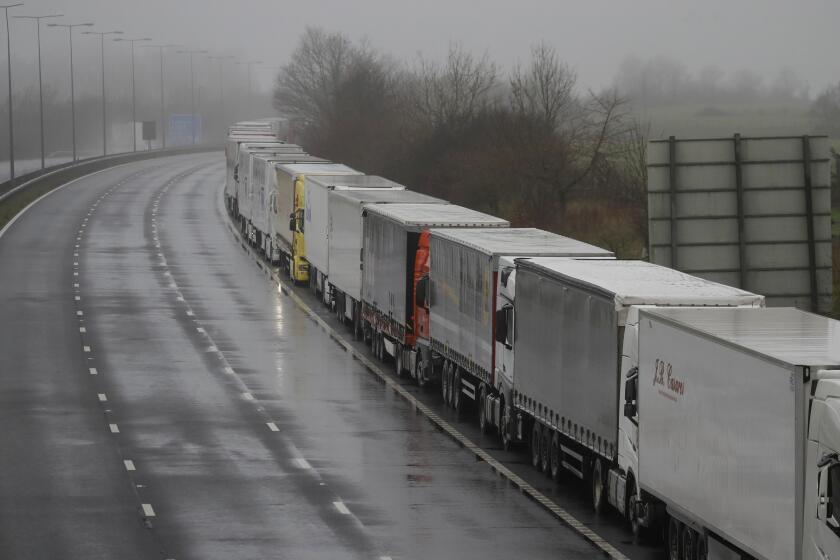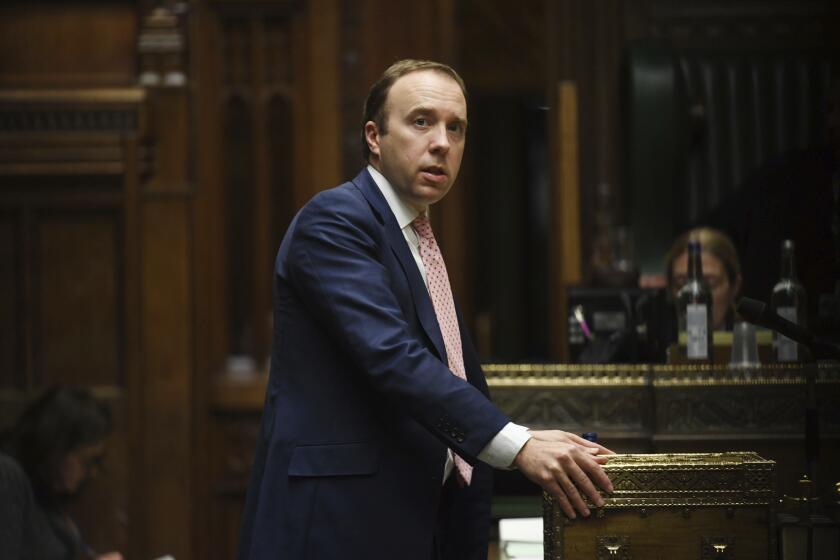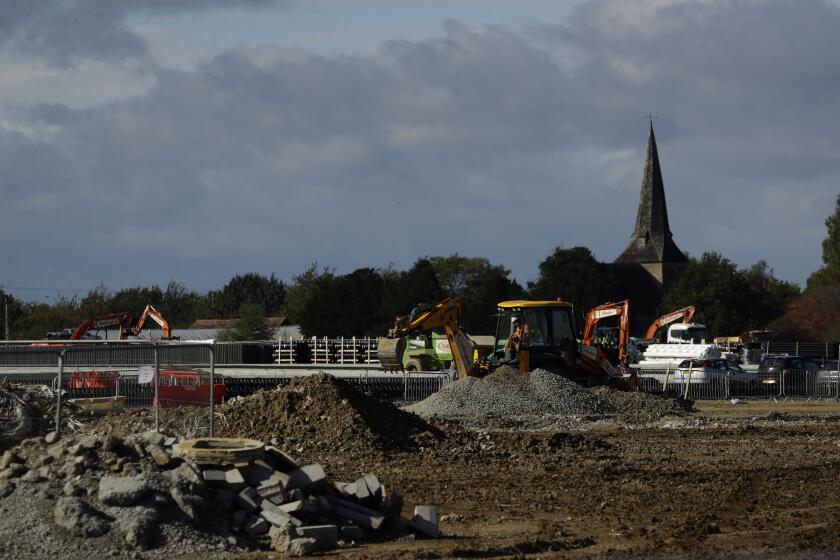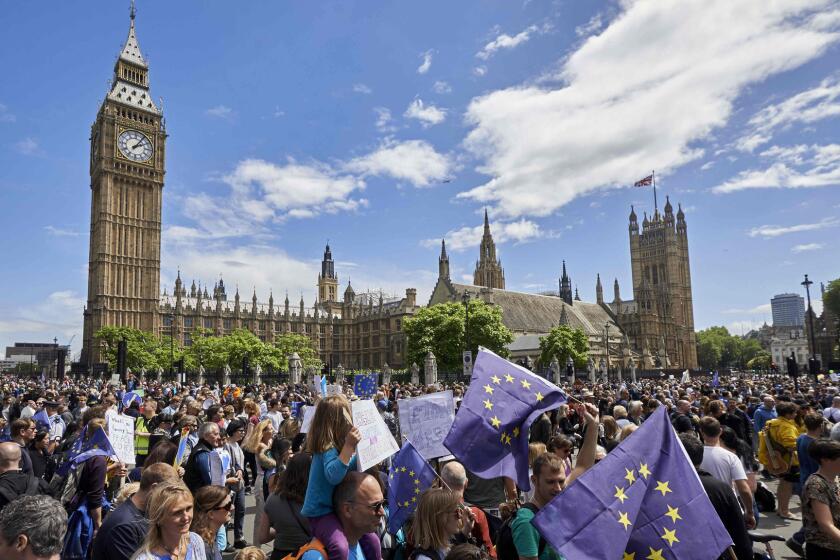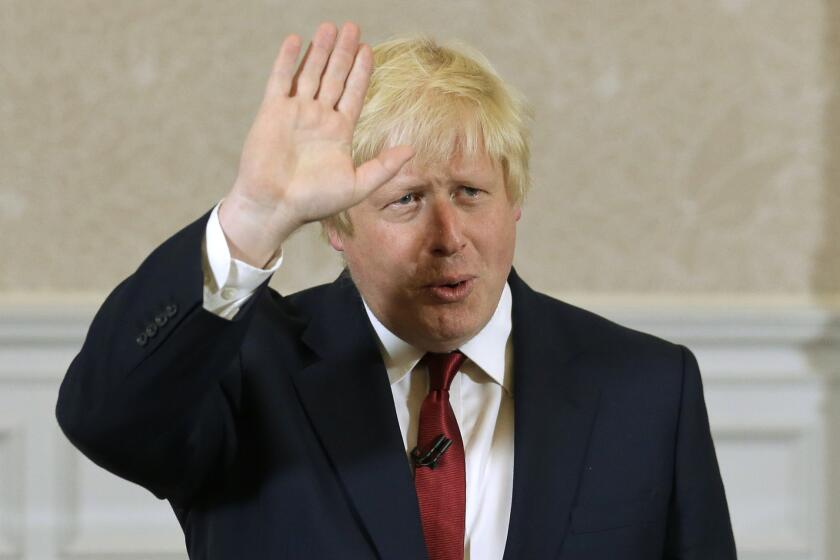Auld lang syne: Britain and the EU finally part ways
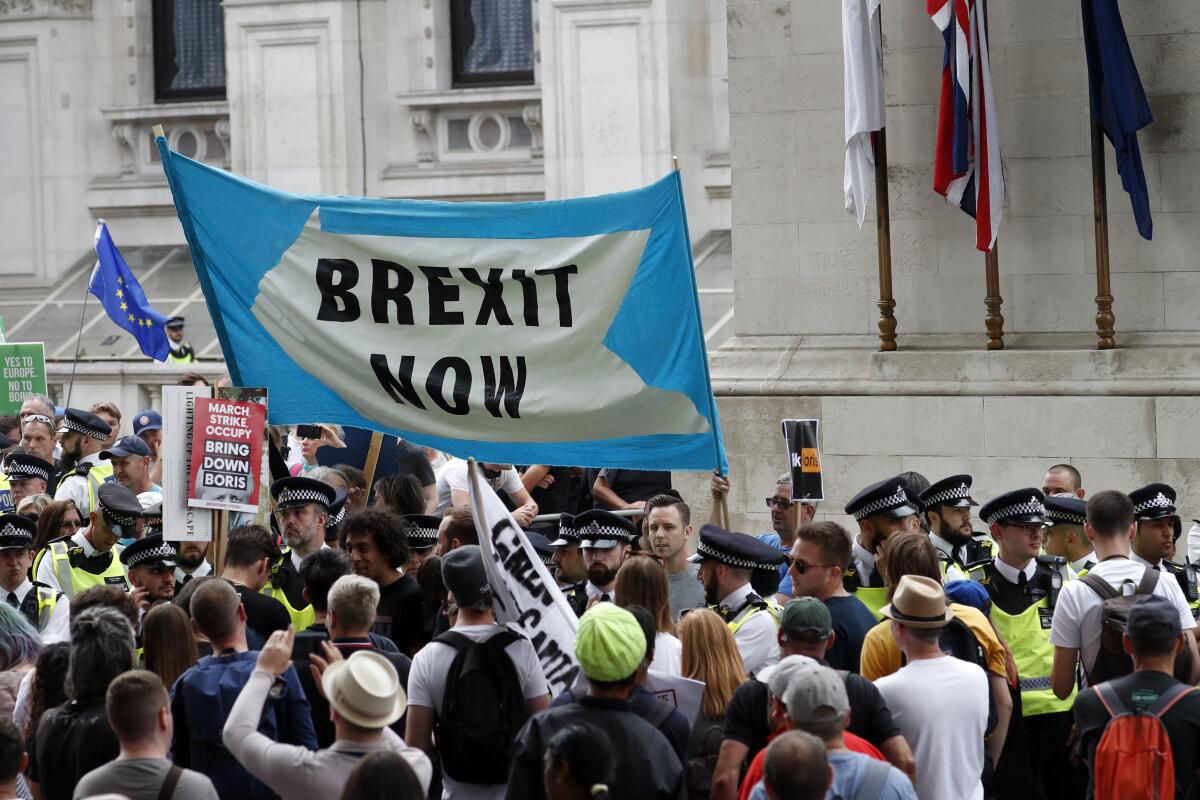
- Share via
LONDON — “Brexit” sounds short and sharp. The reality has been anything but.
Britain’s departure from the European Union finally came to full fruition Thursday, a week after the two sides reached a down-to-the-wire accord governing their future trade relations. It’s been a long time coming: The historic split, set in motion by a shock referendum result in June 2016, was formalized 11 months ago, but then cushioned by a transition period that took up the rest of 2020.
That is now over. Somewhat fittingly, the new era commenced simultaneously yet separately on opposite sides of the English Channel when Big Ben tolled 11 p.m. in London on Thursday and clocks chimed midnight in Brussels, the EU’s de facto capital.
With that, the unmooring was complete: Britain is out of the EU’s massive single market and customs union, removed from the economic integration that had been in place for nearly half a century.
Instead, the two sides agreed to a narrower pact that still allows trade without tariffs or quotas, but throws thousands of businesses into a bureaucratic quagmire and leaves Britain’s enormous financial services sector in limbo. Companies that have operated seamlessly with and in the rest of Europe for decades are now scrambling to adjust to rules contained in a 1,200-page deal they’ve had barely a week to scour.
And as in any divorce, there are lingering psychological scars for some.
In beleaguered Britain, Brexit is coming, Christmas is pretty much canceled and a new strain of the coronavirus brings near-pariah status. What next?
“There was a big part of me that just couldn’t accept that we weren’t going to be part of Europe,” said Dani Chandler, who despaired when the vote to leave the EU won by a slim margin of 52% to 48% four and a half years ago.
She’s now trying to look for the silver linings in the new trade agreement. “I felt Brexit was going to be us saying, ‘We don’t need Europe anymore,’” the 48-year-old clothing store owner said. “I hope the trade deal won’t impact us so much but just open up the doors to other territories.”
For supporters of the break with the EU, Thursday’s exit from the single EU market put the final stamp on a confident assertion of British sovereignty, a shaking off of burdensome European rules. Prime Minister Boris Johnson, whose years of Brexit cheerleading propelled him into the office he passionately coveted, said his country had entered a bold new era.
“This moment is finally upon us, and now is the time to seize it,” Johnson declared Wednesday when the British Parliament approved the trade deal. Ambassadors from the 27 EU nations endorsed the accord earlier this week, with European Parliament ratification expected later.
Defying doubters, Johnson managed to avert the worst-case scenario of Britain “crashing out” of the EU with no deal in place. Even so, his government has warned of “bumpy moments” ahead as Britons absorb the realities of life outside the world’s largest trading bloc — a profound shift that comes in the middle of a raging pandemic that has hit the U.K. particularly hard.
The country has lost more than 71,000 lives to COVID-19 and suffered the worst coronavirus-induced recession of any of the world’s top economies. A new, potentially more contagious variant of the virus is now spreading rapidly in southern England.
That gave Britain a worrisome glimpse of a possible Ghost of Brexit Future when France briefly shut down traffic across the English Channel last week, leading to gigantic lines of trucks stranded for days at the Port of Dover and raising fears about the supply of fresh food in supermarkets. Although the trade deal should obviate much of that, some customs checks and headaches undoubtedly lie ahead.
“Many businesses just haven’t grasped the severity of what’s about to come,” said Anand Menon, a professor of European politics and foreign affairs at King’s College London. “There are all sorts of additional delays and costs built into being outside the customs union and single market.”
Menon predicts that over the next decade, Brexit’s impact on the British economy will be cumulatively worse than the devastating contraction caused by the coronavirus.
British scientists have found a version of the coronavirus with a cluster of genetic changes that make it more transmissible and perhaps more dangerous.
Chandler is bracing herself. With her husband, she runs two fashion emporiums that stock many niche European brands. Now they’re rethinking their inventory, still unclear on their new customs obligations, which will also come freighted with paperwork.
“I know there are going to be problems and delays,” she said. “I can already see it.”
The government has made some attempts to help business owners prepare, but sealing a deal at the last minute only increased the uncertainty.
“Until that first delivery from Europe hits the ports of the U.K., we don’t know what to expect,” Chandler said. “Nobody really knows what is going to happen. I can imagine, in a month’s time, it will be chaos.”
In the corner of Britain known as the Garden of England, Brexit is literally becoming a concrete reality.
The expiration of the transition period Thursday also signaled the end of free movement — the ability to live and work anywhere within the EU, which a generation of Britons had come to regard as their birthright.
Where Brexit boosters see Britain reclaiming power from Brussels, free to control its borders and strike out on its own, critics see a nation retreating into nationalism and nostalgic insularity, a misguided turn that will leave it poorer materially and weaker on the international stage.
“The price of Brexit will come not necessarily around the economic and trade and financial issues, but broader issues of international weight and diplomacy and power,” said Matthew Flinders, a political scientist at the University of Sheffield.
“The deal is about trade, finance and the economy, but the whole EU project was about far more than that,” Flinders added, citing shared values, cultural understanding and a sense of solidarity from facing common risks together. “It was far more than just a market. I think that is what the British government still doesn’t understand.”
News Alerts
Get breaking news, investigations, analysis and more signature journalism from the Los Angeles Times in your inbox.
You may occasionally receive promotional content from the Los Angeles Times.
In addition to smoothing out new diplomatic relations with its Continental neighbors, Johnson’s government also must try to smooth ruffled feathers at home. Much like the Trump presidency in the U.S., Brexit has been the U.K.’s defining and dividing issue of the past four years, causing ruptures within communities and families.
Although even many who voted to remain now just want the process over with — “Brexistential angst,” as Flinders put it — the domestic political reverberations will continue. The regional government in Scotland, where most residents want to stay in the EU, has blasted the trade deal as disastrous and is using it to press the case for another independence referendum.
In a remarkable turnaround over the past few years — and in a sign of trouble for Johnson — polls now consistently show majority support in Scotland for independence.
“Britain now is driven by a divide between leavers and remainers. That is the most important political division in the country,” Menon said. “They have profoundly reshaped our politics. ... It’s a fundamental shift.”
Britain’s departure from the European Union will probably change border routines for Americans eventually, but for now, all stays the same.
And not all Brexit supporters are happy with the terms under which Britain is finally departing.
The country’s fishing communities voted overwhelmingly in favor of Brexit, angered by an EU system seen as too generous toward Europeans fishing in British waters and too crushing for the U.K.’s own iconic fishing industry. Fishing rights were a prime rallying cry and a final sticking point for British negotiators during their exhaustive haggling with the EU.
But the new deal does little to change the status quo for at least five years, when new terms will be worked out. Barrie Deas, chief executive of the National Federation of Fishermen’s Organizations, the main body for fishers in England, Wales and Northern Ireland, said the industry was stung by a gap between “what the government promised, and what it has delivered.”
Johnson “caved in on fisheries,” Deas said.
Plan to keep out ‘low-skilled’ migrants triggers outcry in Britain.
The government has sent mixed messages, seeking to telegraph that little will change in most people’s daily lives while at the same time trying to build in an understanding that some disruption is inevitable.
For instance, Britons accustomed to easy travel on the Continent are now being urged to take out comprehensive travel insurance, check on their cellphone provider’s roaming charges and make sure their passports are valid for at least six months — all matters that previously required almost no planning or forethought. The same is true for EU citizens wanting to visit Britain.
And any feeling of finality after Thursday’s split could be fleeting. Experts say Britain and the EU could still be tied up in talks for years as they iron out or revisit parts of their new political and economic relationship. Johnson’s triumphant statement in Parliament that “Brexit is not an end, but a beginning” could turn out to be true in ways he did not intend.
Still, at least for the moment, he can lay claim to fulfilling his election promise to “get Brexit done.” Britain is definitively no longer a member of the European Union but is now the bloc’s “biggest ally,” Johnson said.
Time — whether measured by Big Ben in London or the clocks in Brussels — will tell.
Special correspondent Boyle and staff writer Chu reported from London. Staff writer King reported from Washington.
More to Read
Sign up for Essential California
The most important California stories and recommendations in your inbox every morning.
You may occasionally receive promotional content from the Los Angeles Times.
